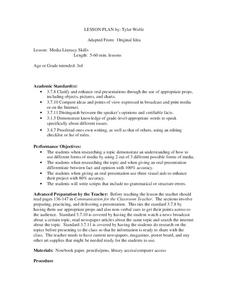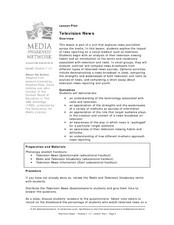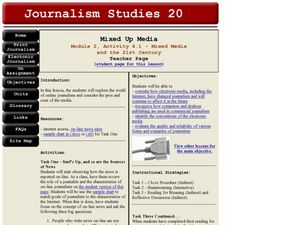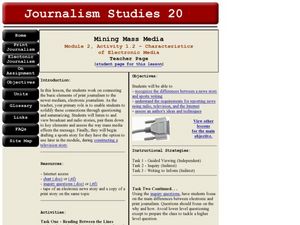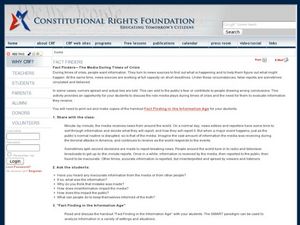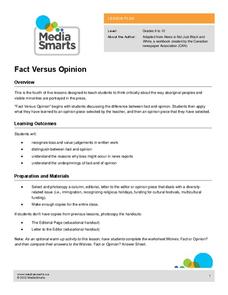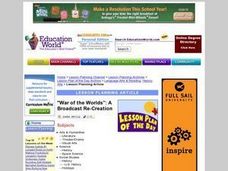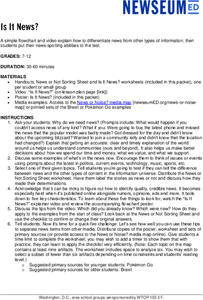Newseum
Media Ethics: Fairness Formula Starts With Accuracy
As part of a study of media ethics, young journalists apply a fairness formula to news reports. They look at accuracy, balance, completeness, detachment, and ethics to determine if the reporting is fair.
Media Education Lab
The Ethics of Propaganda
What are the short and long-term consequences for consumers and producers of modern media propaganda? Class members ponder this essential question as their unit study of ethics of propaganda concludes. After examining two case...
Curated OER
Debate: Press Censorship
Students consider the responsibility of the media to present newsworthy items while still protecting national security during times of war. They take sides acting as politicians and newsmen and debate the merits of censorship of the media.
PBS
What Is Newsworthy?
What is news? What is newsworthy? Who decides and what criteria do they use? Introduce young journalists to the basics of reporting with this media literacy lesson.
Curated OER
Media Literacy Skills
You're on camera! Third graders find a news story and research it to get more information. Everyone uses their found information to write a script and create their own news broadcast!
Facing History and Ourselves
Free Press Makes Democracy Work
A unit study of the importance of a free press in a democracy begins with class members listening to a podcast featuring two journalists, one from a United States public radio station and one from Capetown, South Africa. The lesson,...
PBS
Interviewing: The Art of Asking Questions
Interviewing skills are important, even outside of a news reporter's desk or employer's office. Take your class through the process of interviewing people they don't know with a set of case studies featuring journalists and various...
Curated OER
Television News
Different media sources portray news in a variety of ways. In groups of three, learners look at different news sources, bringing in all the findings the next day. Three handouts help scholars compare sources, define specific terms used...
Curated OER
Mixed Up Media
Students explore online journalism. For this journalism lesson, students discover how electronic medias are changing journalism, examine the conventions of electronic media, and discuss the authority and reliability of forms of...
Curated OER
Mining Mass Media
Learners take a closer look at the attributes of electronic media. In this journalism lesson plan, students compare and contrast electronic and print versions of the same news stories. Learners then write their one broadcast news stories.
Curated OER
Fact Finders—The Media During Times of Crisis
Learners practice finding reputable facts. In this media awareness lesson, students review a handout regarding tips for evaluating media and then discover the SMART method which they use to analyze news sources and media.
Curated OER
Media Bias
Students analyze mass media to analyze media bias. In this media bias lesson plan, students read example situations and definitions about media bias. Students read and discuss how to be aware of media bias.
Curated OER
A Way with Words
How do facts and opinions impact the news? After reading "How to Cover a War" from the New York Times, middle schoolers evaluate the claims in the article. They also consider the media's responsibilities in reporting during wartime....
Media Smarts
Fact versus Opinion
Part of a series aimed at breaking down cultural bias from the Canadian Media Awareness Network, this activity identifies where opinions do and don't belong in a newspaper. Pupils review handouts about the purpose of editorial comments...
Curated OER
The Price of Happiness: On Advertising, Image, and Self Esteem
Are your students aware of the effect advertising can have on their self-image, self-esteem, and happiness? This lesson from the Media Awareness Network is aimed at increasing that awareness and mitigating any negative effects it might...
Curated OER
Journalism and Responsibility
Students explore the world of journalism. In this media awareness instructional activity, students investigate the roles and responsibilities of journalists. Students watch segments of videos and research websites to inform them prior to...
Newseum
'The Press and the Civil Rights Movement' Video Lesson
Scholars watch a video featuring journalists who covered the civil rights movement, then respond to questions on a viewing guide. The video features interviews with participants and original news footage from the 1950s and 1960s. In...
Media Smarts
The Newspaper Front Page
Hot off the presses! A perfect instructional activity idea for a journalism class or even a language arts class looking to incorporate some informational texts. Young writers analyze the front pages of various newspapers to determine the...
Newseum
Free Press Challenges Through History: Analyzing Historical Sources
The debate over the integrity of stories in media is not new. Young journalists analyze historical sources that reveal freedom of the press controversies and draw parallels to challenges freedom of the press faces today.
Curated OER
War and the Media Press Freedom vs. Military Censorship
Pupils analyze the relationship between war and media. In this media awareness lesson, students listen to their instructor present a lecture on freedom of the press and military censorship. Pupils participate in an activity connected to...
PBS
Journalism in War Time: What Does the Public Need to Know?
A viewing of the documentary War Feels Like War, launches an exploration of the importance of accurate and comprehensive war reporting. Groups investigate various news agencies and assess the factors that influence their stories. A...
Curated OER
"War of the Worlds": A Broadcast Re-Creation
Why did Orson Welles' 1938 Broadcast of a adaptation of H.G. Wells' The War of the Worlds cause such a panic? To answer this question, class members listen to the original broadcast and research the panic that resulted. They then engage...
Curated OER
Is the media aiding Global Peace when reporting on religion?
Students play 'telephone' to simulate communication difficulties. In this media analysis lesson plan, students read and analyze newspaper articles related to religious tensions between the Pope and Muslims. Students evaluate...
Newseum
Is It News?
Is it news or not? That is the question young journalists must consider in a lesson about newsworthiness. Class members watch a short video that details five key characteristics of quality, credible news. Individuals then use these tips...






